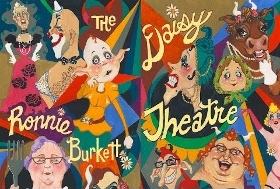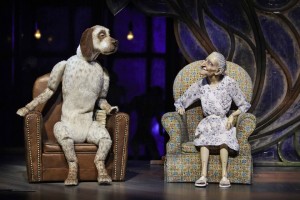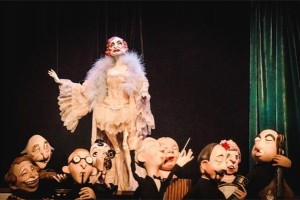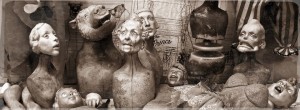HE’S GOT THE WORLD ON A STRING
Last year, I saw an incredible theatrical production—a puppet show no less—that will stick with me for the rest of my life. Written, produced, designed, built, and performed by internationally renowned Canadian puppeteer Ronnie Burkett, Penny Plain was a touching, poignant, humorous, dark, and surprisingly heartbreaking look at the human condition in the wake of mass annihilation. Hardly the stuff of traditional puppetry.
In Penny Plain, he showed an uncanny ability to induce guffaws one second and then with one line or a simple inflection stab me in the heart. Ultimately, it is those moments of tenderness, empathy, sympathy and intense emotion that really set his shows apart. “None of my mentors told me you could do that with a puppet,” Burkett mentioned in a phone interview with Stage and Cinema.
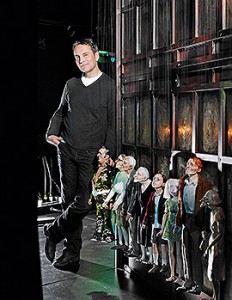 Now Mr. Burkett comes back to Los Angeles November 11-16 at the Ivy Substation in Culver City with his newest show, The Daisy Theatre. Inspired by the illegal underground “daisy” puppet shows of Nazi-occupied Czechoslovakia, and the beginnings of cabaret at the famed Le Chat Noir in Paris, The Daisy (as he likes to call it) is an old-fashioned vaudeville that is part-scripted, part-improvisational and, depending on the room and mood of the day, a different and unique show every night.
Now Mr. Burkett comes back to Los Angeles November 11-16 at the Ivy Substation in Culver City with his newest show, The Daisy Theatre. Inspired by the illegal underground “daisy” puppet shows of Nazi-occupied Czechoslovakia, and the beginnings of cabaret at the famed Le Chat Noir in Paris, The Daisy (as he likes to call it) is an old-fashioned vaudeville that is part-scripted, part-improvisational and, depending on the room and mood of the day, a different and unique show every night.
The puppet bug hit Burkett at seven. By ten years of age, he was writing to puppeteers new and old, asking for advice or offering to come live with them. “My chief mentor was Martin Stevens, who along with his wife performed serious adult drama with marionettes in the 30s and 40s. Unique for their time, they were phenomenal, commanding actors doing things like The Passion Play, Cleopatra and Joan of Arc with very naturalistic serious marionettes.”
Other inspirations were L.A.-based puppeteers Frank Paris (Howdy Doody) and Rene, who taught Burkett a burlesque act which has become a tradition with The Daisy (a strip act starts the show). “Rene just passed away last month and I was bummed that he won’t get the chance to see me perform the act that he taught me.”
As with a lot of “puppet kids” his age, the big cheese was Bill Baird (“The Lonely Goatherd” segment in 1965’s The Sound of Music). The 19-year-old Burkett worked for him in his New York theater. “Pre-Henson, he was the most famous puppeteer in America.” While working with Baird, Burkett won a regional Emmy for Cinderabbit on PBS, which led to years and years of TV work and a lot of series. “It was the Muppet boom and suddenly puppets were on television everywhere.”
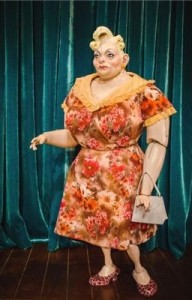 Thanks to the fringe movement, “legitimate theater” was doing bigger shows and plays with marionettes. “I was touring more, so I made a deal with myself that I would leave television work and focus on Theatre of Marionettes. That’s what I’ve done pretty solidly for the last 15 years. I never really thought that was going to happen. It was more of a timing thing. I became a playwright almost by accident.”
Thanks to the fringe movement, “legitimate theater” was doing bigger shows and plays with marionettes. “I was touring more, so I made a deal with myself that I would leave television work and focus on Theatre of Marionettes. That’s what I’ve done pretty solidly for the last 15 years. I never really thought that was going to happen. It was more of a timing thing. I became a playwright almost by accident.”
His international status came with the first installment of his Memory Dress Trilogy plays: Tinka’s New Dress, followed by Street of Blood (1999) and Happy (2000). Is it true that you recently destroyed all the sets from these shows? “Yes, that occurs when there are no more bookings for the shows. More importantly, this happens when I’ve got an idea and start building something else. I always have another show burning in the back of my mind and just chomping at the bit to do. My studio can’t contain that much scenery; it’s a way of putting it on a funeral pyre and sending it out to sea.”
Is it also because you think a show has served its purpose? “I often feel that when I have interpreted a show to the best of my ability and—I think you’ll understand this—when I feel like I’ve had the discussion, it’s time to retire that show. If I didn’t have so many ideas for future work, I would just keep rotating my repertory.” But it’s also 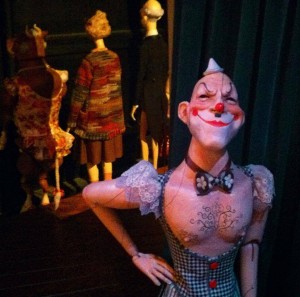 a logistical issue. “With The Memory Dress Trilogy, all three shows were touring simultaneously; I had seven and a half hours of text to keep memorized and renewed. Since then, I desire to do one show, keep it fresh, and then move on.”
a logistical issue. “With The Memory Dress Trilogy, all three shows were touring simultaneously; I had seven and a half hours of text to keep memorized and renewed. Since then, I desire to do one show, keep it fresh, and then move on.”
Yet The Daisy is occurring while Penny Plain is still out there. “The Daisy is just one of those things that will always go on. I believe I will do The Daisy Theater until the end of my career along with any new show. I’m known for dark, intense or serious work which certainly has its own humor, but The Daisy is so much fun that it reminds me to lighten up. Plus, it’s brought me a whole new audience in Canada, with easily half under the age of 30. Oddly enough, it’s regenerating an audience for the next dark, text-based piece.”
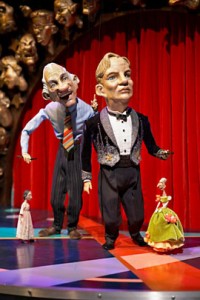 Burkett puts so much of himself in each shows, I wondered if one was his most personal. “Good question. Well oddly enough all of them; but Billy Twinkle, the show right before Penny Plain, had a universal theme about being stuck and realizing you have to look back in order to make the next step forward. It was about a suicidal, middle-aged cruise ship puppeteer whose dead mentor makes him relive his marionette show days. I was playing Billy as a human role with all the puppets around me, but after doing that a couple of years I thought I don’t want to be that exposed; I want to disappear into the story again, which is why in Penny Plain I don’t really have a character. That was a direct result of being so exposed as an actor. But in The Daisy I’m front and center again. You see me. It really is more of a classic puppet show. So once again I’ve gone and exposed myself.”
Burkett puts so much of himself in each shows, I wondered if one was his most personal. “Good question. Well oddly enough all of them; but Billy Twinkle, the show right before Penny Plain, had a universal theme about being stuck and realizing you have to look back in order to make the next step forward. It was about a suicidal, middle-aged cruise ship puppeteer whose dead mentor makes him relive his marionette show days. I was playing Billy as a human role with all the puppets around me, but after doing that a couple of years I thought I don’t want to be that exposed; I want to disappear into the story again, which is why in Penny Plain I don’t really have a character. That was a direct result of being so exposed as an actor. But in The Daisy I’m front and center again. You see me. It really is more of a classic puppet show. So once again I’ve gone and exposed myself.”
Playwrights Canada Press has published each of Burkett’s scripts and there’s an anthology of four scripts. Unlike previous shows with a set text, The Daisy Theatre is an ever-morphing creation. “It’s kind of a working lab for me because I can build a character just for the sake of building it, throw it into the company, and see if it lands or has any relationship with other characters.” Starting with about 27 marionettes, Burkett has 40 for this tour. “I will add 5 to 10 new characters every season, so I will have the option to—in the moment—just grab a puppet who has an interaction with another character or with the audience, depending on what’s going on that day.”
There are three characters that basically anchor and appear in each show. “There’s a tiny little fairy wannabe, Schnitzel, a complete innocent. Then there’s a very bitter jaded old Hollywood showgirl named Esme Massengill who’s drunken and abusive—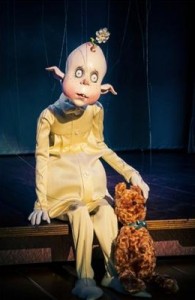 I find her quite funny. The third is a little befuddled farm widow named Edna Rural, who sits in her overstuffed arm chair, and prattles whatever comes into her mind; some nights she just gives out recipes.
I find her quite funny. The third is a little befuddled farm widow named Edna Rural, who sits in her overstuffed arm chair, and prattles whatever comes into her mind; some nights she just gives out recipes.
“These cornerstone characters are equal parts of me: The innocent wishful part I don’t normally reveal; the “I’ve been on the road my whole life” bitter old theater hag; and the befuddled Canadian who tries to be nice all the time but is really confused about the state of the world.
“I’m always thinking of characters, but often there’s no context for them in a scripted show where they are locked into telling that story. The Daisy is that place I can use single characters. It’s kind of like having a rep company in a way.” Burkett then mentions a “talking cow lady” but wasn’t quite sure who she was at the time of creation; now, she’s the owner of The Daisy Theatre.
How do you come up with these characters? “An example: Last Thanksgiving, I was making turkey stuffing using bread called rosemary focaccia. I thought ‘What a great name for a character.’ Then listening to Harvey Fierstein being interviewed, I thought, “There’s Rosemary’s voice!” So basically from Thanksgiving bread and Harvey I got this old, old Vegas lounge singer. She’s coming to L.A. with a whole big number and a big shtick with the band (we have a band in the theater as well).”
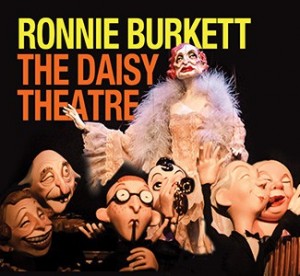 His long-time partner, musician/ composer/jazz vocalist John Alcorn, who lives with him in Toronto, composed the score for Penny Plain and wrote the songs for The Daisy Theatre. “When we’re collaborating there is a murder-suicide brewing but we manage to get through it. It’s just a fact with any collaboration. Even if you have a working relationship and you know each other well, every project has its own new language. Penny Plain was a very restrained score in a way. John is great at razzle dazzle but it needed to be restrained. When we came to The Daisy it was a complete 180. The songs are true music-hall style wherein characters come in, do their novelty number, and then they’re out. It opens with a big sort of Bugs Bunny show tune saying ‘Welcome to The Daisy Theatre.’ Then I requested all these seemingly disparate numbers that aren’t cohesive and we keep adding five new numbers a year.”
His long-time partner, musician/ composer/jazz vocalist John Alcorn, who lives with him in Toronto, composed the score for Penny Plain and wrote the songs for The Daisy Theatre. “When we’re collaborating there is a murder-suicide brewing but we manage to get through it. It’s just a fact with any collaboration. Even if you have a working relationship and you know each other well, every project has its own new language. Penny Plain was a very restrained score in a way. John is great at razzle dazzle but it needed to be restrained. When we came to The Daisy it was a complete 180. The songs are true music-hall style wherein characters come in, do their novelty number, and then they’re out. It opens with a big sort of Bugs Bunny show tune saying ‘Welcome to The Daisy Theatre.’ Then I requested all these seemingly disparate numbers that aren’t cohesive and we keep adding five new numbers a year.”
The Daisy Theatre is also planting seeds for the next scripted show. “I bring audience members up on stage—something I’ve never done—to be a guest puppeteer or to do something with one of the marionettes. One of the three current versions of Schnitzel is a tightrope walker, so I’ll get people to hold the rope. In my new scripted 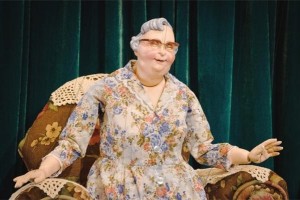 piece, I’m exploring how to authentically utilize civilians into the show. Having done big set pieces for several decades, it keeps me on my toes.”
piece, I’m exploring how to authentically utilize civilians into the show. Having done big set pieces for several decades, it keeps me on my toes.”
While Avenue Q and Jim Henson Company’s Stuffed and Unstrung offer adult-themed amusements, puppet shows are thought of as kid’s entertainment, such as L.A.’s very old school and G-rated Bob Baker Marionettes. Burkett’s shows are geared to adults and really take on some heavy subjects. Rape, AIDS, religion, death—nothing seems beyond the scope of acceptable subject matter. It’s true that puppet voices can get away with more than human voices, but Burkett’s choices are character-driven: “The most interesting ones are villainous because I don’t necessarily agree with those characters but I have to let them be who they are. Also, villains are not just black and white; there’s depth and reasoning to their behavior.”
“For all of the crazy, bawdy or vaudevillian aspects of this nightly sort of improv show, the moments that land for me are those of tenderness. The Daisy Show is chock-a-block full of folly, and tender moments anchor all the silliness. I think Edna Rural sitting in her chair talking about being a widow or worrying about losing her memory is pretty real. I think that everybody has an Edna Rural icon in their life.”
And for everyone who’s tired of the same ole same ole theatrical presentations, I suggest you get your tickets to The Daisy Theater before it sells out. You’ll be glad you did.
photos by Alejandro Santiago and Trudie Lee
Ronnie Burkett Theatre of Marionettes:
The Daisy Theatre
co-commissioned by the Luminato Festival and
Center for the Art of Performance at UCLA (CAP UCLA)
November 11 – 15, 2014 at 8pm
November 16, 2014 at 7pm
Ivy Substation (home of Actors’ Gang)
9070 Venice Blvd in Culver City
for tickets, call 310-825-2101 or visit www.cap.ucla.edu
